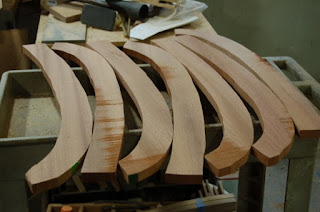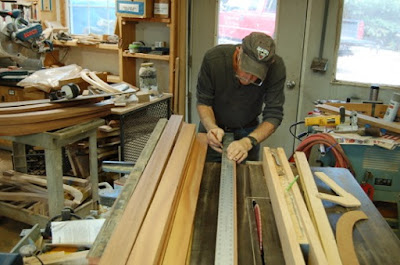Here is Portland-Lewiston Interurban (PLI) No. 10, Arbutus
in Lewiston in June 1914 with PLI staff. Take note of the
train door seen on the No. 2 end. It has an interesting
window setup. The upper window will slide down
for the conductor to reach out to access the trolley
pole rope without opening the door. On the lower half of the
door is a metal plate for the arc headlight to attach to.
Photo from the O.R. Cummings Collection
Here is a close-up. We need to build
one train door from scratch. We have
one original train door from the
Narcissus, with an incomplete set
of window sashes and no hardware.
From the O.R. Cummings Collection
Seashore Trolley Museum Library.
The Arbutus with a clear view of the No. 1 end
train door with the arc headlight attached.
Photo from the O.R. Cummings Collection
Seashore Trolley Museum Library.
The Narcissus is currently being restored at the Donald G. Curry Town House Restoration Shop at Seashore Trolley Museum in Kennebunkport, Maine. The Narcissus, along with nine other historic Maine railway vehicles, has been listed in the National Register of Historic Places since 1980. The Narcissus was built in 1912 at the Laconia Car Company Works in Laconia, NH. The original order was placed in April, the same month the Titanic set sail and sank, and when Fenway Park, home of the Boston Red Sox, first opened. Portland-Lewiston Interurban passenger service commenced on July 2, 1914. Theodore Roosevelt was a passenger on the Narcissus on August 18, 1914.
The Portland-Lewiston Interurban ended electric railway service, eighty-five years ago on June 28, 1933. J. Henri Vallee purchased the body of the Narcissus, minus all the mechanical and electrical components, in the late '30s for use as the family summer camp in Sabattus, Maine. The Narcissus arrived at the Seashore Trolley Museum on October 31, 1969. Forty-nine years later, we are making major progress in the restoration of this historic Maine transportation icon.
We have an arc headlight available for use with the
Narcissus. See the rear of the light where the brackets
attach to the metal plate on the train door.
Ernie Eaton image.
Here is the exterior of the lower portion of
the original train door from the Narcissus. You
can see the two bolt holes on each side where
the metal plate attaches. Notice the wire
extending from the bolt hole on the right.
This is a ground wire that travels through
the wood to the lower hinge. See the image
below. PWM image
The ground wire protrudes from where the lower
hinge attaches to the door. We haven't found
where the headlight wire plugs into its source.
Usually, the outlet is on the exterior. If you
have an idea of where the outlet may be
placed, please let me know. PWM image
The inside of the Narcissus train door.
Two window sash. The lower
sash is designed to have a sheet of
glass and to have screws secure the
window sash to the door frame.
Notice in the top right corner is a
hole and the outline of a component
that would be used to manually
allow the outer window of the door
to slide down or lock the
upper window in a closed position.
We need the mechanical
component to operate the window
properly. The
upper inside sash is designed to not
have a sheet of glass. The door
and sash of the three windows
are mahogany. PWM image
Close-up of the hole and outline of the
missing mechanical components that
allows the conductor to lock the
outside train door window in the upper
(closed) position, or when activated, releases
so that the upper window may slide down
(open) so that the conductor might reach
through the top of the train door to access
the trolley pole rope from inside the
car. We need the mechanical
component to operate the window
properly. PWM image
The hole as seen on the left corner of the inside lower
sash of the train door.
We need the mechanical component to operate the
exterior upper train door window properly. PWM image
We will need to build a replacement
exterior upper train door sash from
mahogany that will slide up and down
PWM image
This is what we have of
an interior upper sash for
the train door. This can be
repaired and will be used to
replicate a new one. It will
also, be used as a guide to
replicate two longer versions
that will also be modified
to accept a plate of glass.
PWM image
The No. 2 end of the right
side steel channel. The steel
channels on both sides will be
replaced. PWM image
Click here to see the post on the removal of the right side sill - including a short video.
Click here to see the post on the removal of the left-side sill.
The two new 37-foot steel
channels each weigh 550-
pounds. Waiting to be moved
into the shop. PWM image
The two new 37-foot steel
channel waiting to be moved
into the shop to have the
holes drilled before being
positioned for installation
as structural support for the
side sills of the Narcissus.
PWM image
A number of the vertical
posts that are the wall studs
for the passenger
compartment needs repairs or
need to be replaced.
This ash board was part of
a major order of green ash
purchased for the Narcissus
and delivered on December
9, 2015. The ash has been
stored while it dried and has
been used periodically
over the past year for use
making various repairs or
for making replacement
components, like the
the vertical wall studs.
PWM image
On the inside of the passenger
compartment between each of
these vertical posts is a
mahogany veneered covered
panel. The surviving panels
are now receiving attention.
PWM image
The surviving passenger panels from the
exterior walls are receiving attention.
Several panels will need to be made to
replace missing panels. The inside
mechanical seat end-plate of each
seat base bolts to one of these panels.
PWM image
Here is an image of one of the
20"-wide mahogany boards
that were used to make the
segments needed to make the
large arched sash that holds
the ornate leaded-stained
glass windows for the
1912 Portland-Lewiston
Interurban, No. 14, Narcissus.
PWM image
Some of the rough-sawn mahogany arch-halves
were cut from the wide boards, then allowed to
sit for several weeks to "settle". The sides would
then be planned flat before the next steps. Below are
a series of short videos showing those steps.
LS image.
Click Here to see the blog post on the first steps of the mahogany sash work.
Lary Shaffer in his woodworking shop marking rough-sawn
mahogany boards that he will then plane straight. These
boards will be finished to be the bottom sash to hold the
large arched ornate leaded stained "eyebrow" windows
for the Narcissus. LS image.
Each of the rough-cut mahogany boards
are compared to a straight edge for
curvature issues. Slight bows or curls
can be planned away while still leaving
the board with the adequate thickness
needed for the next steps in working
towards a finished bottom board for
the sash to receive the large ornate leaded
stained glass windows for the Narcissus.
LS Image
Lary runs the mahogany boards through the planer.
LS image.
The bottom boards and the arch segments are each checked
for thickness after a pass through the planer. Each must be
straight and flat and not below the minimum thickness used.
LS image.
Here the new candidates are for the sash bottoms. LS image
The first video. Lary is explaining the next steps
for preparing the arch sash segments. PWM video
There are lefts and rights
to be used in the next steps.
PWM image
This mahogany is beautiful. The photo doesn't capture
the full luster this arch has. PWM image
Short video of Lary and the next steps. PWM video
Once each rough-sawn arch segment and bottom board were
marked with an outline, each was cut along the outside of the
line, before the next steps. PWM image
Every step in making these sash segments is extremely
time-consuming and takes focus and patience. PWM image
Short video of Lary and the next steps.
PWM video
Short video of Lary and the next step.
PWM video
Short video of Lary and the next step in preparing
segments. PWM video
Two jigs on one baseboard. There are several jigs that Lary
designed specifically for certain tasks in preparing the
mahogany sash segments. This setup is for one of the
arch segments to be run through the shaper to remove excess
wood. One jig is to remove wood on the inside of the arch
and one is for removing wood on the top side. A different
pair of jigs were used for a "left" arch segment and a "right"
arch segment. PWM image
Short video of Lary using one jig to remove
excess wood from the top side of an arch
segment. PWM video
A short video of Lary using one jig to remove
excess wood from the inside of one of the arch segments.
PWM image.
~~~~~~~~~~~~~~~
Click Here: For the list of links to Theodore Roosevelt Maine Heritage Trail Posts in Easy Order to View
We continue the restoration work on the 1912 Narcissus, the only surviving high-speed, luxury interurban coach of the Portland-Lewiston Interurban.
Click Here: Narcissus Restoration-Related Posts
Being more than a century old, the stately, "Elegant Ride," Narcissus, is a gem. This shimmering precious stone of Maine transportation history is brilliantly resplendent as it emanates so many elements of history, including time, places, people, and events, that it was coupled to, that when just a smattering of its seemingly innumerable stories are shared, the contents first captivates, fascinates, then generates interest to learn more 🙋. The majestic Narcissus is listed in the National Register of Historic Places.
Please consider joining the epic journey to complete the Narcissus Project by making a donation today!
Click Here: Donation Options
The restoration of this majestic icon of Maine's electric railway history is but one in a series of captivating stories containing an abundance of incredible coalition of narratives.
Click Here: History-Related Posts - Narcissus and Portland-Lewiston Interurban
The Narcissus is featured in the national Gold Award-winning novel, Teddy Roosevelt, Millie, and the Elegant Ride. The "Elegant Ride" is the Narcissus. Theodore Roosevelt was a passenger on the Narcissus on August 18, 1914, between Lewiston and Portland, Maine, while campaigning for the Progressive Party candidates.
Click Here: Bookstores and Businesses promoting the Narcissus Project
Independent book publisher, Phil Morse, holding
the Gold Book Award Winner plaque for
Middle Reader category for The Eric
Hoffer Book Award. Congratulations to
award-winning Maine author,
Jean M. Flahive






























